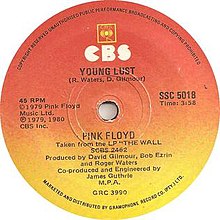Young Lust (song)
| "Young Lust" | |
|---|---|

"Young Lust" cover
|
|
| Song by Pink Floyd from the album The Wall | |
| Published | Pink Floyd Music Publishers Ltd |
| Released |
|
| Recorded | April–November, 1979 |
| Genre | |
| Length |
|
| Label | |
| Writer(s) | |
| Producer(s) | |
"Young Lust" is a song by Pink Floyd. It appeared on The Wall album in 1979. This song was one of several to be considered for the band's "best of" album, Echoes: The Best of Pink Floyd.
"Young Lust" is a blues-inflected hard rock number in E minor, approximately 3 minutes, 25 seconds in length. The lead vocals in the song are sung by David Gilmour, with background vocals from Roger Waters during the chorus. The lyrics are about a "rock and roll refugee" seeking casual sex to relieve the tedium of touring. It is one of the few Pink Floyd songs in which Gilmour plays the bass in the original studio version.
On the album, the preceding song, "Empty Spaces", ends with an abrupt transition into "Young Lust".
The guitar lick at the end of the second verse ("Oooh, baby set me free") has been played live at the end of the final solo in "Learning to Fly."
The Wall tells the story of Pink, an embittered and alienated rock star. At this point in the album's narrative, Pink has achieved wealth and fame, and is usually away from home, due to the demands of his career as a touring performer. He is having casual sex with groupies to relieve the tedium of the road, and is living a separate life from his wife.
The end of the song is a segment of dialogue between Pink and a telephone operator, as Pink twice attempts to place a transatlantic collect call to his wife. A man answers, and when the operator asks if he will accept the charges, the man simply hangs up. This is how Pink learns that his wife is cheating on him. ("See, he keeps hanging up," says the operator. "And it's a man answering!") With this betrayal, his mental breakdown accelerates.
The dialogue with the operator was the result of an arrangement co-producer James Guthrie made with a neighbour in London, while the album was being recorded in Los Angeles. He wanted realism, for the operator to actually believe they had caught his wife having an affair, and so didn't inform her she was being recorded. The operator heard in the recording is the second operator they tried the routine with, after the first operator's reaction was deemed unsatisfactory.
...
Wikipedia
